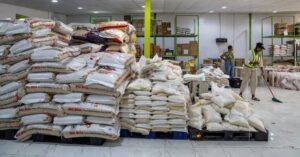The Nigeria Customs Service (NCS) has provided new instructions for enforcing a 150-day tariff waiver on several key food items. This decision follows President Bola Tinubu’s recent approval of a ‘zero tariff’ initiative, aiming to make essential foods more affordable for Nigerians.

The food items covered by this waiver include husked brown rice, grain, sorghum, millet, maize, wheat, and beans. The primary goal of this policy is to reduce the high cost of food in Nigeria, making it easier for people to buy necessary items.
Abdullahi Maiwada, a Customs representative, confirmed these details in a statement released on Wednesday. According to the statement, this policy is part of a broader strategy by the government to tackle the issue of food security in the country. The hope is that by reducing costs, more people will have access to the food they need.
However, this waiver is not just a short-term fix. It is also designed to complement long-term plans aimed at protecting local farmers and manufacturers. The government is keen on ensuring that while prices are lowered for consumers, the interests of those involved in food production within Nigeria are still safeguarded.
To participate in this zero-duty importation program, companies must meet specific criteria. They must be incorporated in Nigeria and have been operational for at least five years, consistently filing annual returns, financial statements, and paying taxes. Additionally, those importing husked brown rice, sorghum, or millet need to have a milling plant capable of processing at least 100 tons per day and have been in operation for four years, with sufficient farmland for cultivation.
For maize, wheat, or beans importers, the companies must either be agricultural enterprises with ample farmland or agro-processing companies with a network of out-growers. The Federal Ministry of Finance will periodically update the NCS with a list of approved importers and their quotas.
Moreover, at least 75% of the imported items must be sold through recognized commodities exchanges, ensuring that all transactions and storage activities are properly documented. Companies are required to maintain detailed records of all activities, which can be reviewed by the government for compliance.
Failure to comply with the terms of the import authorization will result in the loss of all waivers, and the company will be required to pay the applicable VAT, levies, and import duties. This penalty will also apply if any imported goods are exported out of Nigeria in either their original or processed form.
In essence, this waiver is a calculated effort by the government to alleviate the current food crisis, while simultaneously maintaining the integrity of Nigeria’s agricultural sector.




